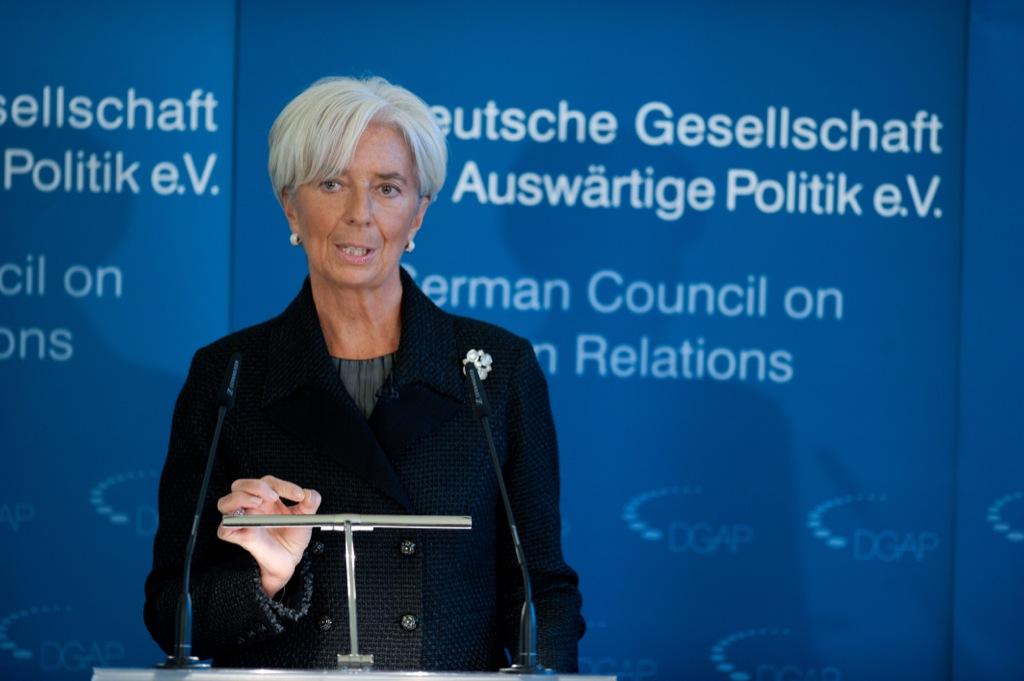Berlin resists pressure from Lagarde and Monti to bolster European Stability Mechanism bailout fund
International Monetary Fund (IMF) President Christine Lagarde addresses a conference in Berlin on Jan. 23, 2012. Lagarde called for a ‘sustainable’ deal for Greece, as talks on reducing the crisis-hit country’s debt appeared to have hit a snag
BERLIN, Germany — Ahead of yet another make-or-break EU summit next week, the German government is resisting pressure to beef up the euro zone’s future rescue fund, the European Stability Mechanism.
"The priority now is to get the ESM into operation, to conclude negotiations and see how much capital we will pay in," Chancellor Angela Merkel said during a press conference with the Belgian Prime Minister Elio Di Rupo on Monday.
More from GlobalPost: Euro zone sovereign debt crisis: 6 lessons for the US
Berlin has spent the weekend rejecting calls for increasing the fund, following media reports that Italian Prime Minister Mario Monti had called for the ESM to be doubled from 500 billion euros ($650 billion) to 1,000 billion euros ($1,300 billion). The ESM is due to replace the current temporary fund, the European Financial Stability Facility (EFSF), this summer.
And the pressure ratcheted up on Monday with Christine Lagarde, managing director of the International Monetary Fund (IMF), also calling on the ESM to be expanded.
“We need a larger firewall,” said Lagarde, addressing the German Council on Foreign Relations in Berlin. “Without it, countries like Italy and Spain, that are fundamentally able to repay their debts, could potentially be forced into a solvency crisis by abnormal financing costs.”
More from GlobalPost: German economics minister sees no risk of recession
Lagarde, who was previously French finance minister, also said she wanted to see the EFSF bundled into the ESM.
“Adding substantial real resources to what is currently available by folding the EFSF into the ESM, increasing the size of the ESM, and identifying a clear and credible timetable for making it operational would help greatly," Lagarde said.
The IMF has helped fund a series of euro zone bailouts over the past two years, forming the third party to the so-called troika alongside the EU and the European Central Bank.
More from GlobalPost: Berlin techno clubs face tax nightmare
While so far only peripheral economies such as Greece, Portugal and Ireland have been forced to avail of bailouts, now bigger economies like Italy and Spain are also seen to be under threat. Euro zone ministers are due to discuss the draft treaty establishing the ESM later Monday, ahead of next week’s EU summit. The current plan would see euro zone leaders waiting until March to assess the size of the fund.
"We are sticking to what was agreed in December," Finance Minister Schaeuble said on Sunday, speaking with public broadcaster ARD. "In March we will check whether that is sufficient."
Schaueble insisted that Germany is doing more than its fair share to resolve the crisis.
"The problems did not emerge in Germany," he said. "We are doing more than all the others and while the European unification has yielded great advantages for us, this does not mean that solidarity is a one-way street."
"We are not yet out of the woods but over the last few weeks, many (debt) auctions have shown that the markets are beginning to regain confidence,” he added.
More from GlobalPost: IMF chief calls for bigger euro zone bailout fund
The World is an independent newsroom. We’re not funded by billionaires; instead, we rely on readers and listeners like you. As a listener, you’re a crucial part of our team and our global community. Your support is vital to running our nonprofit newsroom, and we can’t do this work without you. Will you support The World with a gift today? Donations made between now and Dec. 31 will be matched 1:1. Thanks for investing in our work!
